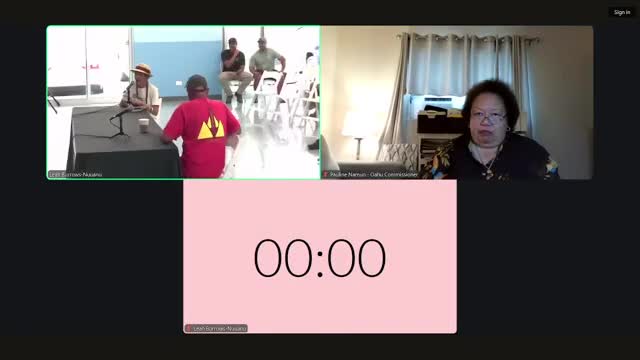Maui beneficiaries press DHHL on water access as Waiahuli well plan moves forward
Get AI-powered insights, summaries, and transcripts
Subscribe
Summary
Beneficiaries and community groups told the Hawaiian Homes Commission on Sept. 16 that water must be prioritized for homestead uses before DHHL advances well and contract work that some speakers said could divert trust resources.
Beneficiaries representing Maui homestead communities urged the Department of Hawaiian Home Lands and the Hawaiian Homes Commission on Sept. 16 to prioritize homestead water before advancing plumbing and well projects that beneficiaries fear could divert trust resources.
At a public-testimony session in Wailuku, members of Pa'opena Community Development Inc. and other Maui homestead organizations called for beneficiary consultation, faster installation of on-site water meters, and clarification about a recently announced DHHL contract. "Water is life," said Tema Watson, a paid staff member of Pa'opena Community Inc., as she told commissioners the department was "giving nearly half of our trust water to the county and to nonbeneficiaries," an arrangement she said would violate the Hawaiian Homes Commission Act of 1920. Watson also told commissioners she was concerned that a $2,460,000 procurement contract with Austin Tutsumi and Associates moved forward before beneficiaries received full disclosure.
Why it matters: DHHL trustees and beneficiaries said access to reliable water is a gating issue for agricultural homesteads and for moving undivided-interest and paper-lease holders into occupation. Testimony linked stalled water meters and unfinished infrastructure to delayed farming, vacant lots and continued wait-list hardship.
What speakers said: Kikuo Inamoto presented written testimony for Pa'opena and read concerns from community leaders seeking a right of entry to roughly 100 acres identified for community agriculture and training fronting Maui Veterans Highway. Neighbor Norman Abihai said his group has a 30,000-gallon tank but lacks distribution meters and could not farm without meter connections. Inamoto read a letter beneficiaries received from the county Department of Water Supply dated Aug. 25 that he said approves plans for three water meters on Pa'opena's 127-acre parcel; DHHL staff, he said, had referred the question internally to planning and land management divisions.
Speaking separately, Blossom Fittera and other Maui residents pressed DHHL and commissioners to re-open the long-discussed nonpotable Keaokea line — a project beneficiaries said began under a tri-party funding agreement in 1986 and stalled — and to make sure Keaokea and Pulehonui homesteads get priority if new well projects are built. Fittera cited a county estimate that completing the Keaokea nonpotable line could cost $13 million to $15 million.
Department response and next steps: Commissioners and DHHL staff acknowledged internal referrals and the need for coordination with county entities, the Legislature and beneficiaries. A DHHL planning-office reply read to the meeting said planning had sent memos to land development and land management and that DHHL would meet internally and keep Pa'opena apprised; beneficiaries asked the commission for a beneficiary consultation and for commission consideration in or after January 2026.
What was not decided: The commission did not hold a formal vote. Commission staff said internal review of the DWS letter was ongoing and that further beneficiary consultations and internal DHHL memos were the next steps. Testimony accused DHHL of breaching fiduciary duty; the commission did not make a ruling on that claim at the meeting.
Ending: Beneficiary groups asked commissioners to withhold action that would allow any export or reallocation of trust water until DHHL completes beneficiary consultation and clarifies how well construction, contracts and interagency agreements affect the trust's duty to beneficiaries.
